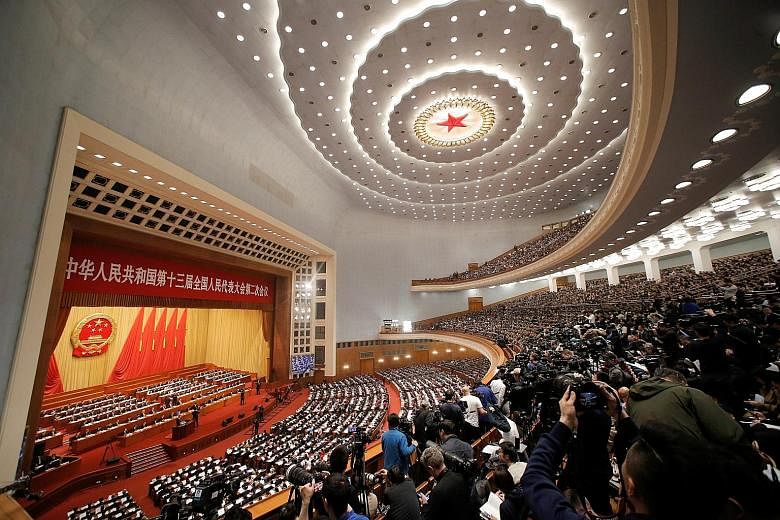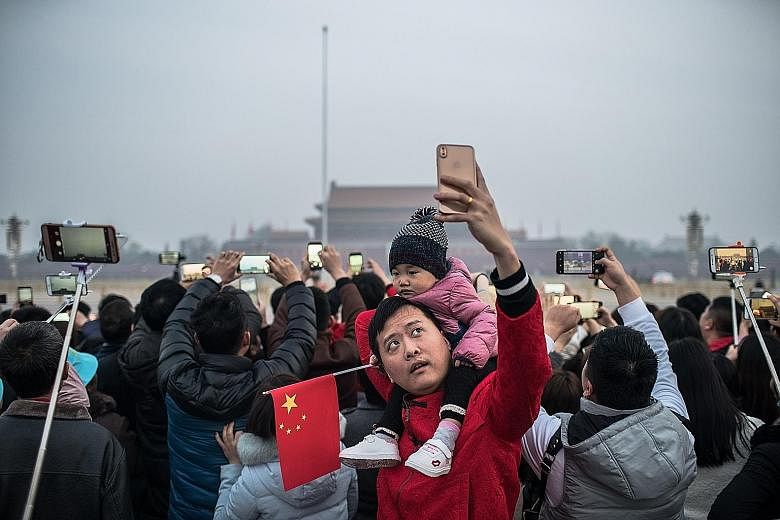China yesterday delivered a Budget featuring tax cuts, greater infrastructure spending and job creation - measures aimed clearly at tackling a slumping economy hit by a trade war and the global slowdown.
While warning of leaner days ahead, Premier Li Keqiang nonetheless struck an optimistic tone in a speech lasting more than an hour, during which he outlined a slew of measures to assuage fears and bolster confidence at home.
As expected, he announced a lower growth target range - of between 6 per cent and 6.5 per cent, against the "around 6.5 per cent" of last year. Economists predicted it would eventually register at the lower end of this range, a further dip from the previous year's 6.6 per cent which was already the slowest expansion in nearly three decades.
Mr Li said China faced a "graver and more complicated environment", but the country "must be fully prepared for a tough struggle".
"The difficulties we face must not be underestimated, our confidence must not be weakened, and the energy we bring to our work must not be allowed to wane," he told the gathering of 3,000 lawmakers at the start of China's two-week-long annual parliamentary session.
An employment-first policy would be pursued with "full force", he said, with the government targeting to create 11 million new urban jobs, while raising medical insurance and pension for citizens.
For businesses, there would be more cuts to taxes and fees, more affordable financing and less burden on contributions to their employees' social insurance.
-
KEY POINTS
-
TAX CUTS
Beijing is reducing the tax burden on businesses significantly, slashing the value-added tax rate to 13 per cent for manufacturers, a 3 percentage point drop. The tax rate for transportation, construction and other industries will be cut to 9 per cent, a decrease of 1 percentage point. Premier Li Keqiang said the measure is aimed at ensuring stable economic growth and employment.
MORE INFRASTRUCTURE FUNDS
The government will invest heavily in infrastructure to stimulate the economy, pouring 800 billion yuan (S$165 billion) and 1.8 trillion yuan into railways as well as roads and waterways, respectively. It is also spending 577.6 billion yuan on IT infrastructure.
BOOSTING EMPLOYMENT
Beijing plans to create 11 million new jobs, and keep surveyed urban unemployment rate at around 5.5 per cent. To do so, it is giving businesses tax reliefs for three years if they hire the rural poor or urban residents who have been unemployed for six months. It is also spending 100 billion yuan on a vocational skills training initiative, upgrading the skills of some 15 million people.
Danson Cheong
While Chinese leaders have consistently maintained they would not resort to massive stimulus to prop up the economy, a point that Mr Li repeated yesterday, the government has decided to pump more money into infrastructure projects, targeting a budget deficit of 2.8 per cent of GDP, from 2.6 per cent last year.
The projects include an 800 billion yuan (S$165 billion) investment in railway construction and 1.8 trillion yuan on road construction and waterway projects.
Defence expenditure would rise by 7.5 per cent to 1.19 trillion yuan this year, a smaller increase than the 8.1 per cent of the year before.
Environmental protection has been given a boost, with a dramatic increase in the budget for fighting pollution. The government has nearly doubled the funds allocated to tackling water and soil pollution, while air pollution control would get 25 per cent more in funds.
Market watchers seeking some clarity on how China would open up to foreign investors, however, will have to wait a little longer.
Mr Li pledged to quicken the pace of reform of state-owned enterprises and make it easier for foreign firms to enter the Chinese market, but stopped short of giving details.
Legislators are expected to pass an investment law next week which aims to address the bugbears of foreign companies and governments which often denounce what they say are China's unfair trade practices. The Bill will ban forced technology transfer and safeguard intellectual property, among other things.
Yesterday, lawmakers especially welcomed the tax cuts, which they said would go some way towards easing the burden on businesses.
"I feel the government... has very realistic measures. The tax cuts will definitely benefit small and medium-sized enterprises... and doing this will also address employment. The tax reductions will allow businesses to employ more workers," said Mr Shi Jialun from the Macau delegation.
Dr Liu Qingfeng, chairman and president of voice recognition technology company iFlytek, said he liked that this year's report was "packed with actual figures".
"By cutting business taxes, we can improve the vitality of our SMEs, and convince more people to strike out and become entrepreneurs," he said.


